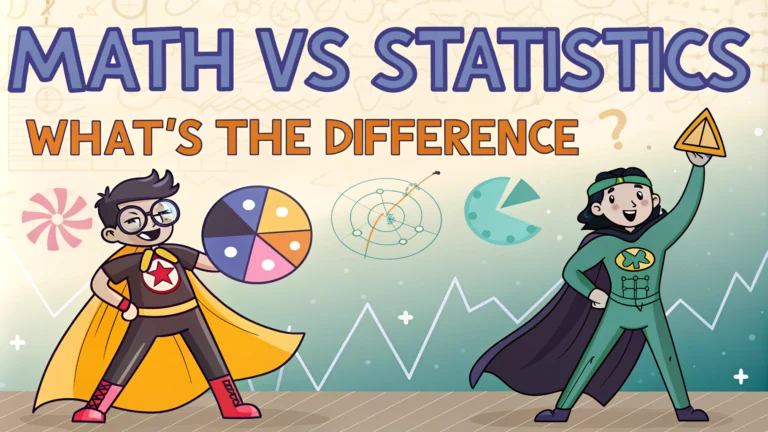Mathematics and statistics serve unique purposes, yet many students and professionals mix up their roles. Math focuses on abstract patterns and relationships, while statistics deals with data analysis and interpretation.
Understanding the core differences between these fields helps you choose the right approach for problem-solving and career decisions. These disciplines complement each other but require different mindsets and skills.
Understanding Mathematical Principles and Their Application
Mathematics centers on **abstract reasoning** and **logical structures**. It includes:
- Pure mathematics: algebra, calculus, geometry
- Abstract problem-solving methods
- Definite answers and proofs
- Universal rules and formulas
Statistics: Data-Driven Decision Making
Statistics applies **mathematical concepts** to real-world data analysis:
- Probability and uncertainty
- Data collection and sampling methods
- Inferential and descriptive analysis
- Variable relationships and correlations
Career Paths and Industry Applications
Each field offers distinct career opportunities:
| Mathematics | Statistics |
|---|---|
| Theoretical Research | Data Science |
| Engineering | Market Research |
| Cryptography | Business Analytics |
“Mathematics reveals patterns, while statistics helps interpret reality.”
Incorporating Technology in Statistical Analysis
Modern **statistical software** and **programming languages** reshape how we handle data:
- R and Python for advanced analysis
- Tableau for data visualization
- SQL for database management
- Excel for basic statistical calculations
Risk Management and Decision Analysis
Both mathematics and statistics play key roles in **risk assessment**:
| Mathematical Models | Statistical Analysis |
|---|---|
| Financial forecasting | Risk probability |
| Optimization algorithms | Trend analysis |
| Quantitative modeling | Predictive analytics |
Best Practices for Data Analysis
Combining mathematical and statistical approaches improves **analytical accuracy**:
- Define clear research questions
- Choose appropriate statistical tests
- Validate mathematical models
- Document methodology and assumptions
- Review results for practical significance
“Good analysis requires both mathematical precision and statistical insight.”
Future Trends and Opportunities
The integration of mathematics and statistics continues to evolve:
- Machine learning applications
- Big data analytics
- Artificial intelligence development
- Quantum computing integration
Professionals who understand both disciplines have advantages in emerging fields like **data science** and **predictive modeling**. The future demands a balanced approach, combining mathematical rigor with statistical interpretation for solving complex problems.
| Emerging Fields | Required Skills |
|---|---|
| AI Development | Advanced Math + Statistical Learning |
| Quantum Analytics | Quantum Math + Probability |
| Bioinformatics | Computational Math + Statistical Analysis |
FAQs About Math vs Statistics
General FAQs
Q: What is the main difference between mathematics and statistics?
A: Mathematics deals with absolute truths and definite answers, while statistics deals with uncertainty, probability, and making inferences from data. Mathematics is deductive, while statistics is primarily inductive.
Q: Can you be good at statistics without being good at math?
A: While basic mathematical skills are necessary, success in statistics relies more on logical thinking and understanding concepts rather than advanced mathematical calculations.
Q: Which came first – mathematics or statistics?
A: Mathematics is significantly older, dating back to ancient civilizations. Modern statistics emerged in the 17th century, though basic counting and data collection existed earlier.
Career and Education FAQs
Q: Do statisticians earn more than mathematicians?
A: According to the U.S. Bureau of Labor Statistics, statisticians often earn slightly higher salaries due to high demand in data science and analytics fields.
Q: Which industries hire more statisticians vs mathematicians?
A:
- Statisticians: Healthcare, market research, tech companies, pharmaceutical
- Mathematicians: Engineering firms, government agencies, research institutions
Long-tail Keyword FAQs
Q: Is statistics harder than calculus for college students?
A: Most students find statistics conceptually challenging but computationally easier than calculus. The difficulty often lies in interpreting results rather than calculations.
Q: What software do I need to learn for statistics vs mathematics?
A:
| Statistics Software | Mathematics Software |
|---|---|
| R, SPSS, SAS | MATLAB, Mathematica, Maple |
Q: Which is better for data science – pure mathematics or statistics?
A: Statistics is generally more directly applicable to data science, particularly for analysis and inference. However, mathematical concepts are important for advanced machine learning algorithms.
Q: What jobs can you get with a statistics degree vs math degree?
A: Statistics degrees typically lead to roles in:
- Data Analyst
- Market Research
- Biostatistician
Math degrees often lead to:
- Financial Analyst
- Operations Research
- Cryptographer
Q: Do you need calculus for basic statistics?
A: Basic statistics requires only algebra and arithmetic. However, advanced statistical concepts and probability theory do require calculus understanding.



















